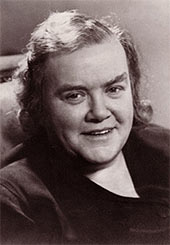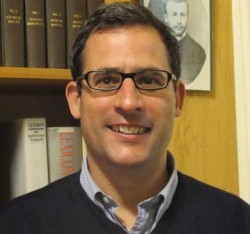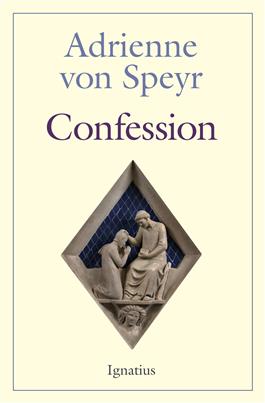Podcast: Play in new window | Download (Duration: 28:13 — 19.4MB) | Embed
Subscribe: Apple Podcasts | Spotify | Amazon Music | Android | Pandora | iHeartRadio | JioSaavn | Podchaser | Gaana | Podcast Index | Email | TuneIn | Deezer | Anghami | RSS | More
 Episode 5 – “Confession” – A Handmaid of the Lord: The life and legacy of Adrienne von Speyr with Dr. Adrian Walker, Ph.D.
Episode 5 – “Confession” – A Handmaid of the Lord: The life and legacy of Adrienne von Speyr with Dr. Adrian Walker, Ph.D.
With Dr. Adrian Walker, we reflect on various aspects of Adrienne’s insight into the nature of confession as described in her book of the same name.
An excerpt from “Confession” Chapter 1: Introduction – The Search for Confession
Let us assume you are my friend, and I say to you, “I can’t go on like this.” We discuss the situation together; perhaps we discover where I got off the track, and perhaps we even refer to my childhood. What we find will help me to make a new start. In every discussion of this sort, however, the individual is viewed as an isolated person, and it does not become clear that he lives in a community both of saints and sinners. Only God knows the laws both of the community of saints and of the community of sinners. In confession I am, of course, this individual sinner, but I am simultaneously a part of humanity, one of its fallen members. Thus conceptual factors are completely different in confession than in analysis. They are both personal and social; indeed, they comprise a totality that draws into focus the world as a whole, its relationship to God, and the first and last things, even if this larger context only falls into our field of vision momentarily and is experienced only indirectly. And since the situation is different, so also are the means of healing. The truth of God is involved, not the truth of the human being, nor the truth of his soul, his existence or the structure of his deeper being, but decisively the truth of God. None of the human techniques takes this divine truth seriously; at most they save it for the hour of death, and they do not help a man to become the kind of person he will need to be in that hour.
As long as aid for the human being is offered by other human beings and is mobile within the human sphere, it can operate only with human means. Everything approaching a person from external sources can be considered only as accidental and external and be supplied with a positive or negative label; the unity between interior and exterior, however, cannot be effected. The psychological session can offer me only “modes of behavior” applicable to the present, which themselves can and must change under altered conditions. Confession, on the other hand, brings a person face to face with his divine destiny and places him directly within it—within that which is final and ultimate.
As long as a person is not confessing, he feels free to speak or keep silent about whatever he wishes. What he then hates in confession is not the humbling experience of revealing himself, and not the fact that he is a sinner—he already knows that somehow—but the necessity of capitulating before and within total confession, the fact that the freedom of selection has been withdrawn and that the only choice remaining is to reveal everything or nothing. He is sick as a whole person and must be healed as such, and not eclectically. That is the first humbling experience. The second is that he is only one of many and has to accept the same conditions as do the others, even external conditions such as having to appear at the confessional at an appointed hour: a kind of marked condition, the elimination of all external differentiation—the factory owner and the watchman, the lady and her cook, all on equal footing. Precisely when one confesses that which is most intimate, one no longer has a choice or selection, is put on a level with all other sinners and is merely one penitent in the line of other sinners. The peculiarities of my particular “case”, which made it seem so interesting to me and which I would so gladly have explained to the listener, do not matter at all any more. Confession [Beichten] is above all precisely that: a confession [Bekenntnis] not only of my sins but also a confession to God and to God’s precepts and institutions, indeed to his Church with her own weakness and her myriad ambiguous, even disturbing, aspects.
The act of “speaking” with someone about my life does not oblige me further. Afterward, I can experience a certain feeling of gratitude or of awkwardness toward the person who has listened to me, but I remain the free person who can detach himself again. Confession is not an individual act in the same sense; nothing in it can be isolated. The act of confession expressly involves the whole person, his whole life, his whole world-view, his whole relationship to God.
Speyr, Adrienne von. Confession (Kindle Locations 180-209). Ignatius Press. Kindle Edition.
 Adrienne von Speyr was a Swiss convert, mystic, wife, medical doctor and author of over 60 books on spirituality and theology. She’s inspired countless souls around the world to deepen their mission of prayer and compassion. She entered the Catholic Church under the direction of the great theologian, Hans Urs von Balthasar. In the years that would follow, they would co-found the secular institute, the Community of St. John.
Adrienne von Speyr was a Swiss convert, mystic, wife, medical doctor and author of over 60 books on spirituality and theology. She’s inspired countless souls around the world to deepen their mission of prayer and compassion. She entered the Catholic Church under the direction of the great theologian, Hans Urs von Balthasar. In the years that would follow, they would co-found the secular institute, the Community of St. John.
For more episodes in this series visit Dr. Adrian Walker’s Discerning Hearts page
Adrian Walker is an editor of the journal Communio, an International Catholic Review, who received his doctorate in philosophy at the Pontifical Gregorian University in Rome. Dr. Walker has served as a translator for the English edition of Pope Benedict XVI’s, ” Jesus of Nazareth”, as well as numerous other theological works, including those of Hans Urs von Balthasar and Adrienne von Speyr.
Our series recorded at “Casa Balthasar“, a house of discernment for men located in Rome, Italy. The Casa, was founded in 1990 by a group of friends and is directed by Rev. Jacques Servais, S.J.; Joseph Ratzinger (Pope Benedict XVI) has been closely associated with the Casa Balthasar from the very beginning as its Cardinal Protector.
Many of Adrienne von Speyr’s books can found through Ignatius Press



